Florida is home to some of the top law schools and programs in the country. While many people may automatically associate the midwest and northeast as having the best law schools, Florida boasts some of the most impressive programs and faculty not just in the United States, but internationally as well.
Today, we are examining the 10 best law schools in the country, based on their appearance on the US News and World Report ranking of best law schools. The schools on this list have some of the country’s best post-graduation prospects, bar passage rates, and professional development training and opportunities. Students at any of these schools won’t run out of clinical externships, faculty mentorship, student trial organizations, and more.
Law schools in Florida are multifaceted, diverse, and have a lot to offer. Many of them are relatively young, but already have an outstanding track record in job placement and producing outstanding lawyers.
Without further ado, here are the 10 best law schools in Florida.
10. Nova Southeastern University Shepard Broad College of Law (Fort Lauderdale, FL)
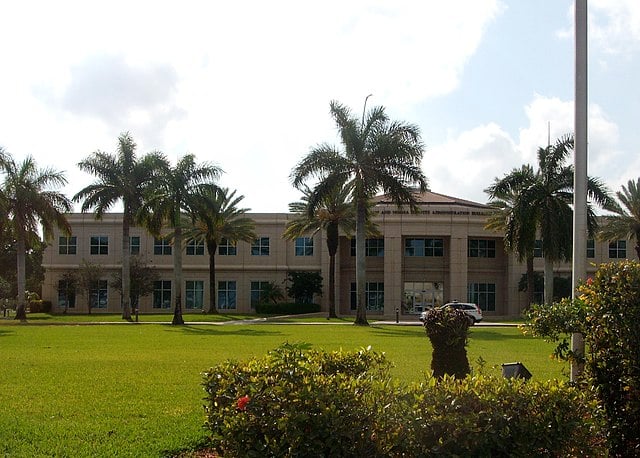
NSU Shepard Broad College of Law has been climbing its way up national rankings. Its Trial Advocacy Program recently moved up to #50 on the US News and World Report ranking; additionally, its Health Law Program is ranked #54. Most notably, the Legal Research and Writing Program ranked #18. It is not easy to outrank the nations’ hundreds of law schools and programs in any of these categories. Indeed, it is a testament to the school’s devoted and preeminent faculty, many of whom have published extensively in their fields.
More than half of the law school graduates pass the bar exam. The curriculum is very practice-centered, equipping students with the skills and training necessary for academic and professional success. Like any good law school, clinical and experiential education is embedded into the curriculum. Students acquire hands-on experience through various in-house clinics, such as the Adults with Intellectual & Developmental Disabilities (AIDD) law clinic.
As one of Florida’s rising-star law schools, Shepard Broad College is a great starting point for the aspiring lawyer.
9. Florida Coastal School of Law (Jacksonville, FL)
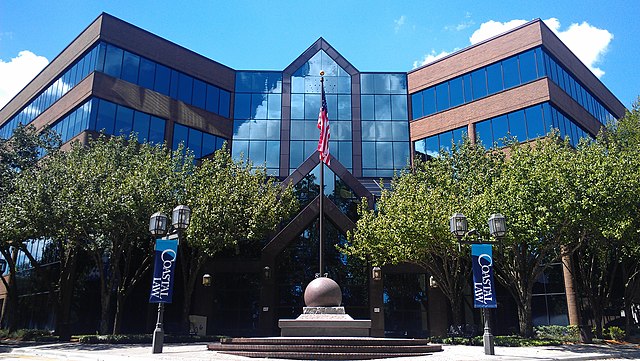
The Florida Coastal School of Law is the first in the country to offer a fully online LL.M. in US law for international lawyers. Additionally, its mission is centered on student outcomes, offering a unique and innovative Practitioner Clinic, described as a “hybrid between a clinic and externship,” as well as many resources for boosting academic and professional success.
Through the Practitioner Clinic program, students partner with active legal practitioners to work on pro bono cases, serving the broader community. Combining a focus for student outcomes with a commitment to serving the underserved, Coastal Law can boast that it “walks the talk” when it comes to its professed mission.
Despite being a young school, over 6,000 have graduated from Coastal Law. Many graduates have become lawyers, legal practitioners, and advocates worldwide, proving that Harvard Law or Yale Law are not the only places where one can start an impactful and meaningful career in law; even the smallest and lesser-known gems can help forge this path.
8. Florida A&M University College of Law (Orlando, FL)
The first and only historically black college on the list, Florida A&M University College of Law is committed to serving the needs of underserved populations in Florida and beyond. Over 80% of its graduates are members of the Florida Bar.
FAMU College of Law faculty have published groundbreaking research on the intersections of law, gender, race, and social justice, on entertainment law and business, and in nearly every other imaginable area of law. Numerous alumni have been appointed as judges in judicial courts throughout the country. Current FAMU Law students earn accolades and awards before they even graduate, and over half of those who take the bar exam pass.
The school prepares its students through rigorous coursework on the emerging trends in law and through clinical and experiential education. Simulation courses constitute a core component of experiential education. Legal clinic offerings include a comprehensive Homelessness and Legal Advocacy clinic that helps low-income individuals navigate the legal system.
7. Barry University Dwayne O. Andreas School of Law (Orlando, FL)
The second school on this list located in one of the most vibrant cities in Florida, the Barry University Dwayne O. Andreas School of Law is one of the most diverse law schools in the country, earning an A+ grade from PreLaw Magazine. The school is ideal for any student looking for high-quality and rigorous education, high employment prospects, and rich professional development experience.
In recent years, Barry Law’s Moot Court and Mock Trial teams have won national competitions. Dean and founding faculty member of the law school, Leticia M Diaz, won the “Woman of the Year” award at the 47th Annual Women’s Achievement Awards in 2019. She also won the Lifetime Achievement Award for Diversity at the Orlando Business Journal’s Diversity in Business Awards and is the Cuban-American woman to hold a high position at an ABA-accredited law school In the US.
These recent accolades are a testament to Barry Law’s rising status as a top-notch law school in Florida.
6. Ave Maria School of Law (Naples, FL)
Ave Maria School of Law graduates have an overall pass rate of around 74% on the bar exam; over half are gainfully employed within 10 months of graduation. A couple of interesting facts: the law school was originally located in Ann Arbor, Michigan, and the late Supreme Court Justice, Antonin Scalia, assisted in developing its curriculum. The school was relocated to Naples in 2009 and has been thriving ever since, as indicated by its graduates’ success rates.
It is the only school on this list rooted in the Catholic intellectual tradition, boldly proclaiming itself to be “Catholic. Conservative. Competitive.” Alongside coursework in Tort, Criminal Law, and Contracts, first-year students are required to take a course entitled “The Moral Foundations of the Law.”
Students can hone their lawyering skills and develop their resumes through moot court, externships, and the Clinical Program. Existing clinics are the Estate Planning and General Practice Clinic and Patent Law Clinic.
Ave Maria offers an invaluable educational and professional development experience within the framework of Catholic values.
5. Stetson University College of Law (Gulfport, FL)
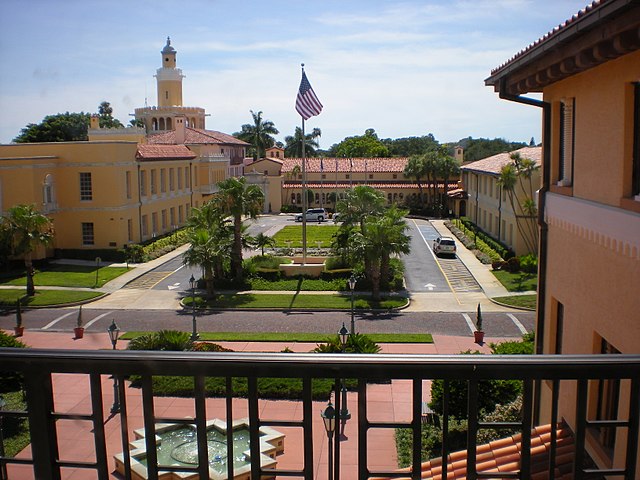
With a post-graduation employment rate that breaks into the 90’s and top programs in Trial Advocacy and Legal Writing, Stetson Law is one of the top schools in Florida and in the country. It is also one of the very few schools in the country where every student is guaranteed an externship. With these highlights, it is no wonder why Stetson Law breaks into the top 5 on this list.
Stetson Law Trial and Moot Court teams have won dozens of national competitions and championships. The school encompasses several institutes and centers, including the one-of-a-kind Institute for Caribbean Law and Policy and its numerous initiatives. Its world-class faculty have made appearances on Netflix and Apple TV documentaries and have published work in top journals.
Admission to Stetson Law is quite selective, with less than half of applicants gaining admission in recent years.
4. Florida International University College of Law (Miami, FL)
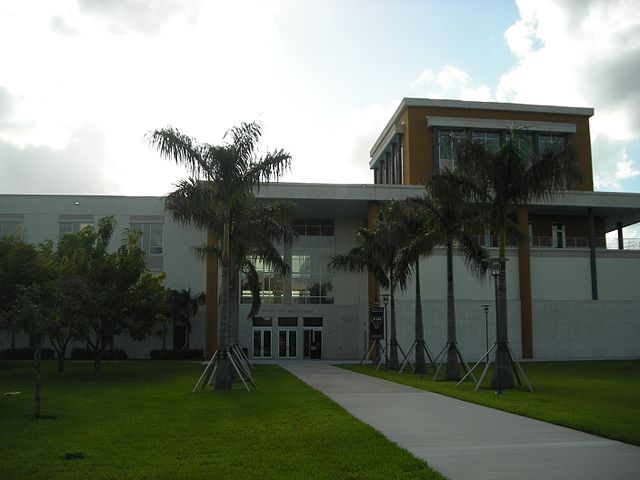
FIU College of Law is the only public school in South Florida, ranking high in overall bar exam passing rates. The passing rate for the class of 2019 was an outstanding 94.8%. Approximately 75% of the class of 2018 obtained full-time employment after graduation.
In addition to a Clinical Program and a variety of externships, FIU Law offers third and fourth-year students a Semester-In-Practice Practicum. For an entire semester, students work full time at a private firm, a non-profit agency, corporation, or government agency. Through the practicum, students have an opportunity to put their classroom learning into practice and develop their skills as prospective lawyers.
The school is located in Miami’s vibrant metropolis, where professional development opportunities and multi-cultural experiences abound.
FIU is one of the most selective schools on this list; in 2020, only 33% of applicants were admitted.
3. University of Miami School of Law (Coral Gables, FL)
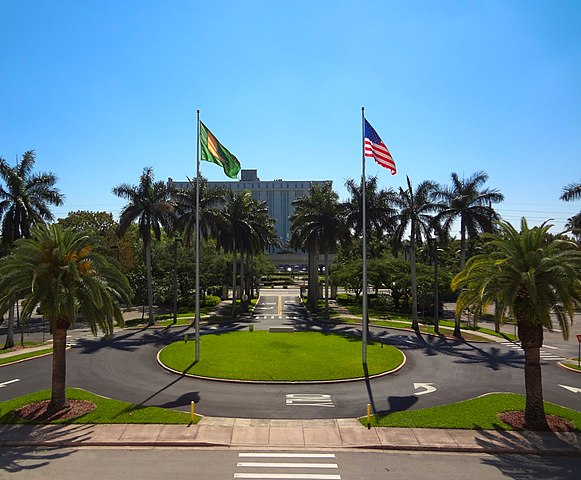
The University of Miami School of Law is the oldest law school in South Florida. Its programs and reputation have stood the test of time, being one of the country’s top law schools.
The school boasts 18 areas of study and more than 300 course offerings. Opportunities for experiential education are abundant, with 18 clinics and practicums. In sum, students receive thorough and rigorous training in their areas of interest.
The school has a reputable Environmental Law program, which includes an Environmental Justice Clinic and access to one of the world’s most unique ecosystems. Indeed, Florida’s Everglades National Park is the natural backdrop for this program. A Miami Law student was recently awarded the very prestigious fellowship at the Washington DC-based Environmental Law Institute. Miami Law is consistently touted as a top school for International Law as well.
Notable faculty include Marilyn Milian, host of the People’s Court, and Jan Paulsson, a world-renowned expert in international arbitration.
2. Florida State University College of Law (Tallahassee, FL)
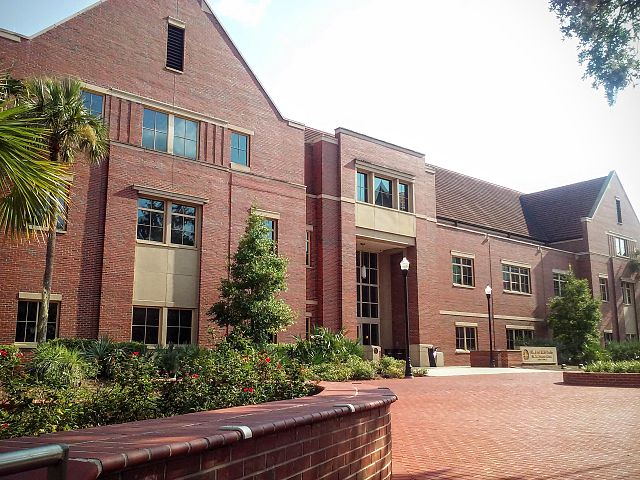
FSU College of Law has made to the top spot across a variety of rankings and lists. PreLaw Magazine named it as the #1 law school for careers in government and #7 for human rights and public policy. It is the first school on this list to break into the top 20 on the US News and World Report list for top law schools.
Its Center for Environmental, Energy and Land Use Law is nationally recognized, providing students with excellent practical law, advocacy, and policy training. The Director, Dr. Erin Ryan, has presented her wide-ranging research throughout the US and the world and has authored many scholarly works, including a book on federalism, published by the preeminent Oxford University Press.
Over 70% of graduates obtain full-time employment within ten months of graduation. The bar passage rate for the school hovers around an impressive 80%. Of course, FSU College of Law is a selective school, with an acceptance rate of 35% in 2019.
1. University of Florida Levin College of Law (Gainesville, FL)
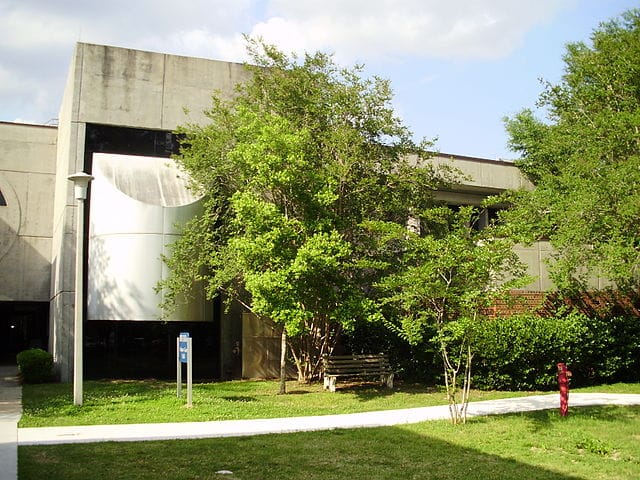
Last, but not least, is the outstanding University of Florida Levin College of Law. It is the oldest operating law school in the state of Florida. In recent years, approximately 80% of each graduating class found full-time employment in the law sector within a year of degree completion. It was ranked #21 in “Best Law Schools” and #2 and #20 for its Tax law and Environmental Law programs, respectively.
The acceptance rate for 2020 was a mere 20%, making it the most competitive school on this list. Levin College of Law faculty are experts in their field and have very active research profiles to complement their outstanding teaching.
A myriad of “hands-on” opportunities are offered to students, ranging from faculty-supervised clinics and field placements to externships and advocacy programs.














